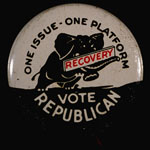
Note to President-elect Barack Obama: Health reform doesn't have to be all about expanding health insurance. It can be about the little things too, such as shorter waits in the doctor's office and putting in place incentives such as free checkups that catch little problems before they became big ones. That was the message Tuesday from two-dozen seniors who gave their views about what ails America's health care system to former Senate Majority Leader Tom Daschle, Obama's choice for secretary of health and human services. They listed a broad range of concerns, from four-hour waits to see a doctor, to the high cost of prescription drugs, to lack of Medicare coverage for certain treatments and medical devices. Daschle said conversations like Tuesday's will put the new administration "on the right track" for overhauling the nation's health care system next year. – AP
Dominant Social Theme: Health care reform will come in many flavors
Free-Market Analysis: Tom Daschle is among the most partisan of notable American Democrats, and his appointment by Barack Obama as secretary of health and human services puts the nation on notice that health-care reform is an administration priority. Yet curing health-care problems in America would likely take a good deal of deregulation – and Obama's administration is headed in the other direction.
The current system is being hit by a kind of perfect storm of costs, regulations and narrowing professional options. So many plans, so many insurance agencies and so much paperwork are seemingly involving the entire American medical profession into a slow trudge toward insolvency. Of course, it's no secret that many influential Democrats want to move toward a "single payer" system – nationalized health care. And a year ago, such ideas looked relatively simple. But today progress is complicated by the current economic crisis, no matter what intentions were to begin with.
It is possible that Daschle and Obama intend to frame the American medical debate in terms of public works projects. With the nascent administration already calling for work submissions from municipalities and from states, it would not be a giant leap for the upcoming administration to include health care in these plans. And certainly one idea being considered (we don't favor it, naturally), is to grow a federal medical system alongside the current system. Perhaps the idea would be to justify the additional cost via Keynesian pump priming. And the immediate trigger could be the intention to "fix" what's wrong with the current public medical system – Medicaid and Medicare – by trying federally organized solutions on for size.

The result of all of the above would be a far larger public medical system than what is available now. And since the current system is already on course toward insolvency, one guesses that medical expansion plans will only end up aggravating America's tenuous fiscal condition. Loading on even more costs, through centralization of even more services will certainly do the trick. And in the process, it will inevitably aggravate the dollar's ill health and further retard American economic growth at a time when growth is already slowing dramatically. Such plans, in fact, are a kind of recipe for a currency collapse. If it happens, there will be arguments over whether such a collapse was systematic (strategic) or serendipitous. In other words, whether some people had the notion that pushing America to the brink was not such a bad idea.
